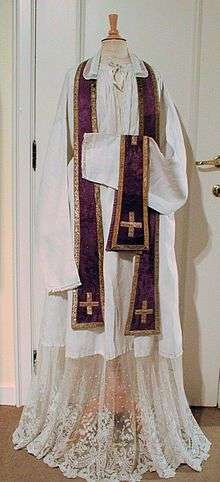Definify.com
Webster 1913 Edition
Stole
Stole
,imp.
Steal
. Stole
,Noun.
[L.
stolo
, -onis
.] (Bot.)
A stolon.
Stole
,Noun.
[AS.
stole
, L. stola
, Gr. [GREEK] a stole, garment, equipment, fr. [GREEK] to set, place, equip, send, akin to E. stall
. See Stall
.] 1.
A long, loose garment reaching to the feet.
Spenser.
But when mild morn, in saffron
First issues from her eastern goal.
stole
,First issues from her eastern goal.
T. Warton.
2.
(Eccl.)
A narrow band of silk or stuff, sometimes enriched with embroidery and jewels, worn on the left shoulder of deacons, and across both shoulders of bishops and priests, pendent on each side nearly to the ground. At Mass, it is worn crossed on the breast by priests. It is used in various sacred functions.
Groom of the stole
, the first lord of the bedchamber in the royal household.
[Eng.]
Brande & C.
Webster 1828 Edition
Stole
STOLE
, pret. of steal.STOLE
,Noun.
1.
A long vest or robe; a garment worn by the priests of some denominations when they officiate. It is a broad strip of cloth reaching from the neck to the feet.2.
[L.] A sucker; a shoot from the root of a plant, by which some plants may be propagated; written also stool.Definition 2025
stole
stole
English
Verb
stole
- simple past tense of steal
Etymology 2
Old English stole, Latin stola, Ancient Greek στολή (stolḗ, “stole, garment, equipment”), from "to set", "place", "equip", "send", akin to English stall.
Noun
stole (plural stoles)
- An ecclesiastical garment consisting of a decorated band worn on the back of the neck with each end hanging over the chest.
- Certain robes indicate a position in the hierarchy; others correspond to function and may be worn by the same individual at different times. The most important vestment among the insignia [of the clergy] is the stole, the emblem of sacerdotal status, the origin of which is the ancient pallium. The stole originally was a draped garment, then a folded one with the appearance of a scarf, and, finally, in the 4th century, a scarf. As a symbol of jurisdiction in the Roman Empire, the supreme pontiff (the pope, or bishop of Rome) conferred it upon archbishops and, later, upon bishops, as emblematic of their sharing in the papal authority. Copyright 1994-1998 Encyclopaedia Britannica CD 98 Multimedia Edition
- 1938, Xavier Herbert, Capricornia, Chapter X, p. 167,
- With sou'-wester under arm, and oilskin open so that God might see the stole and know that there was no deception, he chanted from a prayer-book in a tone exactly like that of a blackfellow devil-dovvening: […]
- A scarf-like garment, often made of fur.
Translations
ecclesiastical garment
scarf-like garment
Etymology 3
Noun
stole (plural stoles)
References
- stole in Webster’s Revised Unabridged Dictionary, G. & C. Merriam, 1913
- “stole” in Douglas Harper, Online Etymology Dictionary (2001).
Anagrams
Czech
Pronunciation
- IPA(key): /ˈstolɛ/
- Rhymes: -olɛ
- Hyphenation: sto‧le
Noun
stole
Synonyms
- (locative): stolu
Danish
Pronunciation
- IPA(key): /stoːlə/, [ˈsd̥oːlə]
Noun
stole c
- plural indefinite of stol
Verb
stole (imperative stol, infinitive at stole, present tense stoler, past tense stolede, perfect tense har stolet)
